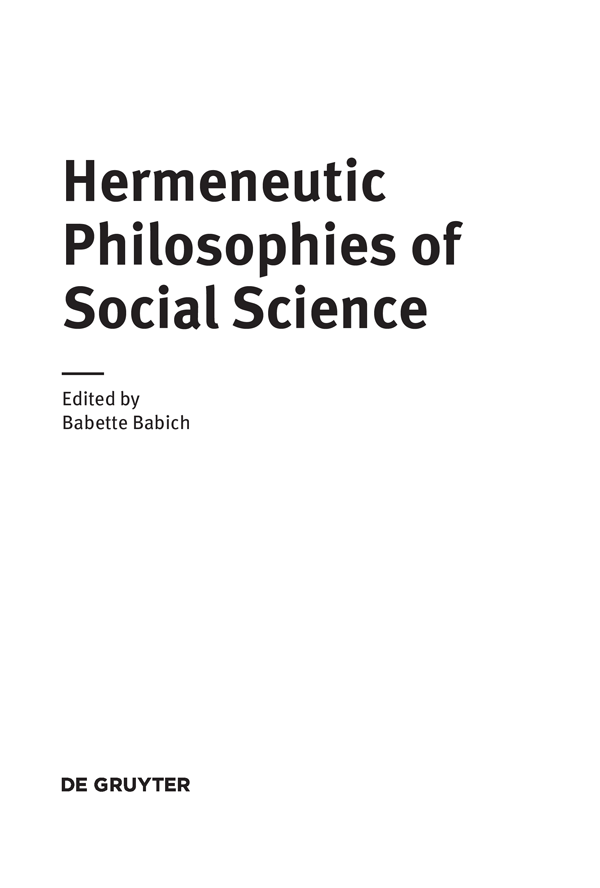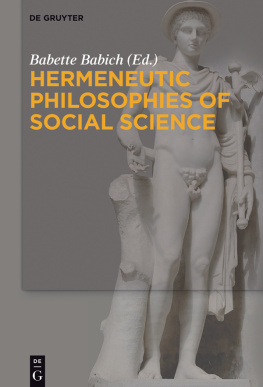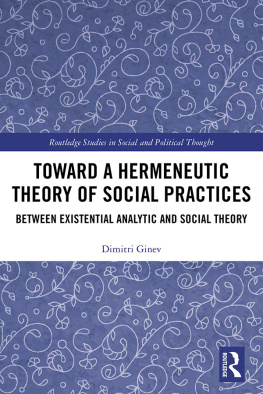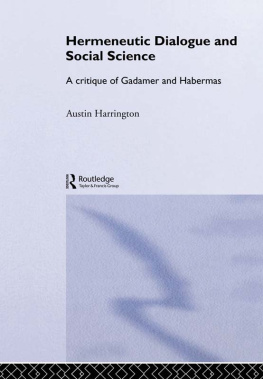Babette Babich - Hermeneutic Philosophies of Social Science
Here you can read online Babette Babich - Hermeneutic Philosophies of Social Science full text of the book (entire story) in english for free. Download pdf and epub, get meaning, cover and reviews about this ebook. year: 2017, publisher: De Gruyter, genre: Religion. Description of the work, (preface) as well as reviews are available. Best literature library LitArk.com created for fans of good reading and offers a wide selection of genres:
Romance novel
Science fiction
Adventure
Detective
Science
History
Home and family
Prose
Art
Politics
Computer
Non-fiction
Religion
Business
Children
Humor
Choose a favorite category and find really read worthwhile books. Enjoy immersion in the world of imagination, feel the emotions of the characters or learn something new for yourself, make an fascinating discovery.
- Book:Hermeneutic Philosophies of Social Science
- Author:
- Publisher:De Gruyter
- Genre:
- Year:2017
- Rating:5 / 5
- Favourites:Add to favourites
- Your mark:
- 100
- 1
- 2
- 3
- 4
- 5
Hermeneutic Philosophies of Social Science: summary, description and annotation
We offer to read an annotation, description, summary or preface (depends on what the author of the book "Hermeneutic Philosophies of Social Science" wrote himself). If you haven't found the necessary information about the book — write in the comments, we will try to find it.
Hermeneutic Philosophies of Social Science — read online for free the complete book (whole text) full work
Below is the text of the book, divided by pages. System saving the place of the last page read, allows you to conveniently read the book "Hermeneutic Philosophies of Social Science" online for free, without having to search again every time where you left off. Put a bookmark, and you can go to the page where you finished reading at any time.
Font size:
Interval:
Bookmark:

Hermeneutic Philosophies of Social Science

ISBN 978-3-11-052837-4
e-ISBN (PDF) 978-3-11-055156-3
Set-ISBN 978-3-11-055157-0
Library of Congress Cataloging-in-Publication Data
A CIP catalog record for this book has been applied for at the Library of Congress.
Bibliographic information published by the Deutsche Nationalbibliothek
The Deutsche Nationalbibliothek lists this publication in the Deutsche Nationalbibliografie; detailed bibliographic data are available on the Internet at http://dnb.dnb.de.
2017 Walter de Gruyter GmbH, Berlin/Boston
www.degruyter.com
Ren Descartes
| CSM | The Philosophical Writings of Descartes , ed. J. Cottingham, R. Stoothoff and D. Murdoch, 2 vols. Cambridge: Cambridge University Press, 1985. |
Wilhelm Dilthey
| DGS | Gesammelte Schriften , 28 vols. Gttingen: Vandenhoeck & Ruprecht, 19142011. |
| SW | Selected Works , ed. Rudolf A. Makkreel and Frithjof Rodi. Princeton: Princeton University Press, 1985 ff. |
Hans-Georg Gadamer
| PCH | Le probleme de la conscience historique . Louvain: Publications Universitaires, 1963. |
| WM | Wahrheit und Methode: Grundzge einer philosophischen Hermeneutik . Tbingen: Mohr, 1960. |
Martin Heidegger
| GA | Gesamtausgabe . Frankfurt a.M.: Klostermann, 1975ff. |
Edmund Husserl
| BW | Briefwechsel , ed. Karl Schuhmann and Elisabeth Schuhmann. In: Husserliana Dokumente , vol. 3. Dordrecht: Kluwer, 1994. |
| EU | Erfahrung und Urteil. Untersuchungen zur Genealogie der Logik , ed. Ludwig Landgrebe. Prag: Academia, 1939 (reprint Hamburg: Claassen & Goverts, 1948; Hamburg: Felix Meiner, 1999). |
| HM | Husserliana Materialien . Dordrecht: Kluwer/Springer, 2001ff. |
| Hua | Husserliana . The Hague/Dordrecht: Nijhoff/Kluwer/Springer, 1950ff. |
Immanuel Kant
| CPR | Critique of Pure Reason , tr. Norman Kemp Smith. London: Macmillan, 1929. |
Friedrich Nietzsche
Quotations of Nietzsches writings are from KSA ( Kritische Studienausgabe ). References for English translations are given in the authors reference sections.
| KSA | Nietzsche, Friedrich, Smtliche Werke. Kritische Studienausgabe , 15 vols., ed. Giorgio Colli and Mazzino Montinari. Munich/Berlin/New York: DTV/De Gruyter, 1980. |
Abbreviations of Nietzsches works:
| BGE | Beyond Good and Evil |
| BT | The Birth of Tragedy |
| GM | On the Genealogy of Morals |
| GS | The Gay Science |
| WS | The Wanderer and His Shadow |
| Z | Thus spoke Zarathustra |
Richard Rorty
| CIS | Contingency, Irony, and Solidarity . Cambridge: Cambridge University Press, 1989. |
| ORT | Objectivity, Relativism, and Truth, Philosophical Papers , vol. 1. Cambridge: Cambridge University Press, 1991. |
| PMN | Philosophy and the Mirror of Nature . Princeton: Princeton University Press, 1979. |
| PSH | Philosophy and Social Hope . Harmondsworth: Penguin, 1999. |
Babette Babich
Interpretive philosophical reflection, hermeneutics, is inseparable from any philosophy of social science. Indeed, to the extent that the social sciences include the human subject, reflection on reflection is integral and such reflection constitutes, whether one names it as such, or not, part of the hermeneutic turn.
This collection of essays offers a range of hermeneutically minded philosophies of social science foregrounding understanding and including a specific attention to history as well as a methodological reflection on the notion of reflection but also subjective obstruction: prejudice or pre-judgments as Joseph J. Kockelmans speaks of these in his chapter below. This same approach informs what has been called a humanist by contrast with a naturalistic approach to the social sciences. Currently, although fashions change constantly, some contemporary hermeneutic studies include so-called thing ontology (there are other names), and hermeneutic philosophies of social science also embrace social studies of knowledge as well as social studies of natural science as these latter are themselves, as Bruno Latour has long argued, so many social practices.
Yet there is at the same time a tendency to resist the language of hermeneutics in connection with the philosophy of science. This may be further exacerbated today as part of the quantitative turn in todays university-level human and social sciences. In part, this is due to a certain hard-science anxiety on the part of the social scientists themselves who worry, rather as the title of Bent Flyvbjergs book Making Social Science Matter seems to suggest,
Approaches to hermeneutic philosophies of social science that may be considered hermeneutic, quite in spite of this surprisingly durable constellation of anxiety and suspicion, can be found. Examples include James Bohmans New Philosophy of Social Science (1991) and Harvie Fergusons Phenomenological Sociology as well as Andrea Nyes work on logic, although Nyes loyalties are explicitly analytic and thus historicist, alongside other work in feminist epistemology and philosophy of science, both natural and social, although, once again, the great majority of these studies remain analytically rather than continentally minded.
Hans-Georg Gadamer (1900 2002) reflected on hermeneutic philosophies of social science in a series of chapters included in his Reason in the Age of Science .
The task of philosophy in our technoscientific era is to think where, as Heidegger said, science does not think and not less to communicate, needful where, as Gadamer says, science does not really speak a language in the proper sense.
Here, we consider Gadamers observation, inspired by Nietzsches demand that one doubt more profoundly and fundamentally than Descartes), and further amplified by the critique of ideology that
called scientific neutrality into doubt. It questioned not merely the validity of the phenomena of consciousness and of self-consciousness (which was the case with psychoanalysis) but also the purely theoretical validity of scientific objectivity with which the sciences laid claim.
Beginning with Heideggers reflections on the Greek legacy of rationality inspires the new notion of interpretation, whereby
The very idea of a definitive interpretation seems to be intrinsically contradictory. Interpretation is always on the way. If, then, the word interpretation points to the finitude of human being and the finitude of human knowing then the experience of interpretation implies something that was no implied by the earlier self-understanding when hermeneutics was coordinated with special fields and applied as a technique for overcoming difficulties in troublesome texts. Then hermeneutics could be understood as a teaching about a technical skillbut no longer.
Thereby we can begin with his invitation to consider
the traditions within which we standand every tradition that we creatively or appropriatively pass onoffer less an objective field for the scientific mastery of a subject matter or for the extension of our domination by knowledge of the unknown than a mediation of ourselves with our real possibilities engulfing uswith what can be and what is capable of happening to and becoming of us.
Font size:
Interval:
Bookmark:
Similar books «Hermeneutic Philosophies of Social Science»
Look at similar books to Hermeneutic Philosophies of Social Science. We have selected literature similar in name and meaning in the hope of providing readers with more options to find new, interesting, not yet read works.
Discussion, reviews of the book Hermeneutic Philosophies of Social Science and just readers' own opinions. Leave your comments, write what you think about the work, its meaning or the main characters. Specify what exactly you liked and what you didn't like, and why you think so.






